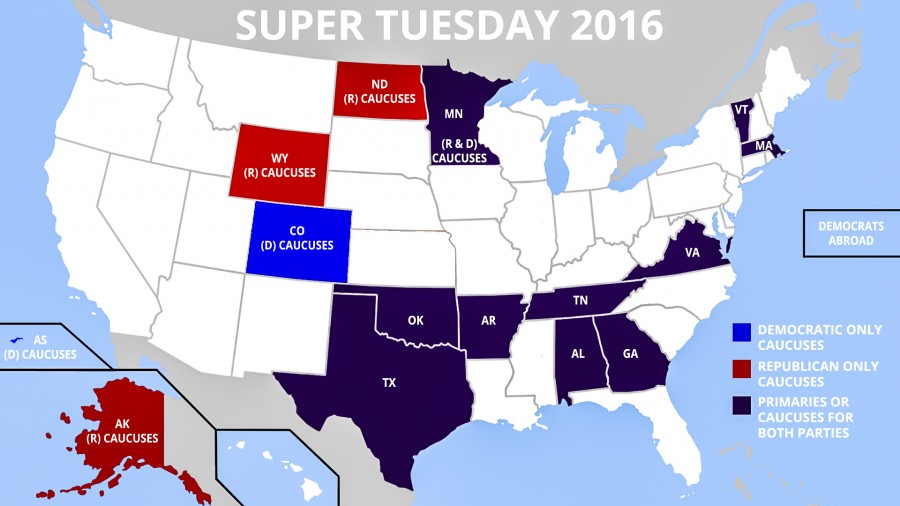It’s Super Tuesday — Here’s Who NYU Students Want to Come Out Ahead
March 1 is Super Tuesday this year, and will set the stage for the primaries to come.
March 1, 2016
Politically active students at NYU anxiously await the Super Tuesday primaries, which will be held in 13 states across the country today. Although every state within the United States participates in choosing presidential nominees who will run in the general election in November, states with early primary dates often affect candidates’ momentum and can drastically influence parties’ eventual nominees.
Since an earlier primary date essentially equates more national influence, states often try to schedule their primaries as early as possible. As a result, more than 20 percent of states stack their primaries and caucuses on one day: Super Tuesday. States holding primaries include Alabama, Arkansas, Georgia, Massachusetts, Minnesota, Oklahoma, Tennessee, Texas, Vermont and Virginia, while Republicans will caucus in Alaska and Democrats will caucus in Colorado and American Samoa.
Within the Democratic party, Bernie Sanders and Hillary Clinton have been relatively close in the polls and there is some disagreement on who will come out victorious on Super Tuesday. CAS sophomore and member of the NYU College Democrats Fadumo Osman said she will be voting for Bernie Sanders in the primary election.
“He calls out the need to reform campaign financing — while being the only candidate without a super PAC,” Osman said.
Osman added that she admires the consistency in Sanders’ values as he has advocated for the same beliefs throughout his lifetime.
“I’d rather have someone who has been a part of movements versus someone who says they wish they had been a part of them,” Fadumo said.
However, other students tend to see Clinton as the ideal democratic candidate. SPS sophomore Cole Daniel Solaas said he is planning to support Clinton because of her previous experience and more centrist values.
“I do lean moderate, but I believe she is one of the few candidates that has many years in the political field and much experience,” Solaas said. “I also think she is not an extremist, and she can get things done and meet in the middle.”
While Solaas believes that Clinton will secure a clean sweep on Tuesday, Fadumo trusts that Sanders will put up a fight and secure states such as Minnesota and Vermont.
Regarding the Republican party, the debate is slightly less controversial as students tend to believe that Donald Trump will maintain his position as frontrunner of the Republican elections. SPS junior and Field Director for College Republicans Eli Nachmany recognizes Trump’s lead but also highlights the gains that could be made by Ted Cruz and Marco Rubio.
“I think it’s very reasonable to expect a Donald Trump sweep, except for Texas, where I believe Ted Cruz will win,” Nachmany said. “If there is any candidate who could surprise people, Marco Rubio may steal a state or two. It is also important to note that Ted Cruz has a strong ground game in many southern states.”
Although a victory from Trump is expected, many Republican students are not content with this imminent victory, such as CAS senior Matthew Glaser.
“I’m surprised at the performance of Donald Trump,” Glaser said. “I thought his candidacy was going to be a complete joke and a hoax. I’ll quote Trevor Noah on this one: ‘watching Donald Trump’s campaign is like the cinnamon challenge — it’s fun for a while but then it starts to hurt. Right now is when it’s going to start hurting.’”
Tomorrow’s primaries and caucuses have the potential to solidify Democratic and Republican front-runners in the presidential race. Republican and Democratic students alike will soon see if polarizing candidates like Trump or Sanders will have staying power among the U.S. public.
Email Brooke Jensen at [email protected].
























































































































































